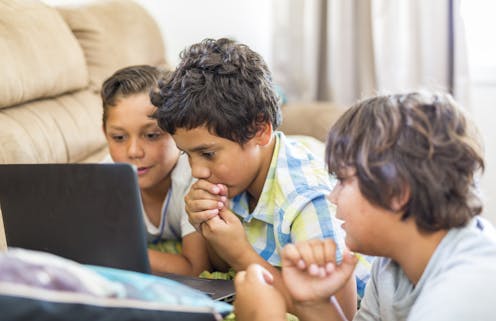'Decolonising' classrooms could help keep First Nations kids in school and away from police
- Written by The Conversation

The recent decision to transport juvenile offenders into an adult maximum-security prison in Western Australia shows the youth justice system is in crisis. The findings of the Don Dale Royal Commission, and the landmark Royal Commission into Aboriginal Deaths in Custody were uncomfortably similar, even though being held almost three decades apart. Key similarities included a lack of training and accountability for prison staff, and an acknowledgement there was a need for policing reform and adequate community engagement.
Both of these commissions called for broad reforms across many different sectors, including policing and education in Australia. However many of these recommendations remain unimplemented.
As we observe Aboriginal and Torres Strait Islander Children’s Day today, our thoughts will be focused on the First Nations youth prisoners and their families. However we must also think of the processes, systems and institutions that resulted in these crises, what could have been done to prevent them, and what can we do to ensure they never happen again.
We know when any youth offender, regardless of their ethnicity, is released from detention, the likelihood of ending up back in prison is extremely high. In some cases, up to 80% of young people return to prison.
On average, 50% of young people in detention in Australia are First Nations, despite only representing about 6% of the overall youth population of the country.
For a lot of children, their first experiences of trouble and marginalisation in response to authority can manifest in the classroom. We also know the longer children engage with their formal schooling, the less likely they are to come into contact with the judicial system as children and adults.
So what can schools and teachers do to improve First Nations student engagement and retention?
One way to address First Nations youth incarceration lies with schools and teachers acquiring the skills and confidence to begin the process of decolonising their classrooms. This requires teachers and schools to change their approaches to include First Nations contexts across all aspects of teaching and learning.
There have been recent improvements in First Nations student retention and completion of year 12 qualifications, which was a target in the Closing the Gap strategy.
However too much of the focus of student retention has been put on the students and their families, with absenteeism from school a constant measure built into Indigenous education targets. Very little attention has been placed on the colonised classroom spaces these children are forced to endure.
The focus in Australian schools on the contributions of European colonisers and not on members of our rich, diverse and long-lasting First Nations leaders and heroes can have a profound cultural impact on all children in this country.
A way forward to support the outcomes of First Nations students and their engagement with school, is to begin the process of decolonising the classroom. There are five ways this can be done:
1. Policy
State, territory, and federal jurisdictions all have Indigenous education policies which cover things like, attendance rates, community engagement, and content and teaching methods used in the classroom. However, few of these policies are implemented effectively in classrooms. Implementing these policies which already exist is a good place to start.
2. Content
For generations of teachers and students, the content in the curriculum has been dominated by a Euro-centric focus on Australia’s recent history and “western traditions” of liberal democracy and Judeo-Christian values. This has come at the cost of including knowledge about First Nations cultures, and this phenomenon is known as the “Great Australian Silence”. This refers to the active erasure of First Nations histories, and although there has been some improvement, it still dominates classrooms today.
3. Education
Our children are part of the oldest continuous cultures in the world, and they are also taught these cultures from infancy from their families, Communities, and Countries. It stands to reason then, that we have the oldest teaching methods in the world that are perfectly suited to our kids and that can support all learners as well. First Nations ways of teaching should be incorporated into all classrooms.
4. Place and space
Our children need to see themselves reflected in their schools. This includes flags, acknowledgement plaques, art works, library books and other ways of making First Nations contexts more visible. They also need to be in spaces that are fit for purpose, especially when engaging with First Nations teaching approaches including yarning and on-Country learning. This might mean having movable furniture in classrooms, and access to outdoor spaces to engage directly with Country.
5. Community engagement
As much as we wish every First Nations student was taught by a First Nations teacher, this isn’t always possible. Much of our learning and knowledge is held by our Elders. They need to be present and visible in our schools, and our students need to be able to access Country and Community as part of their learning. This is how it has always been.
When these aspects are reformed, the classroom no longer becomes a reason not to attend school, and as students remain at school longer, they are less likely to engage with the judicial system.
We know not one single solution will address this complex problem, and any actions in this space must be supported by reforming and preventing the over-policing and unjust targeting of our kids. But non-Indigenous teachers have a role to play to decolonise their classrooms, lest we condemn yet another generation of our young people to the brutality and revolving door of youth incarceration.







